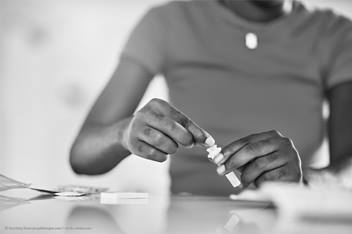HIV Infection/AIDS
![]()
HIV (human immunodeficiency virus) is a virus that causes a number of different health problems including AIDS (acquired immune deficiency syndrome). The HIV virus is passed from person to person in certain ways:
- Sexual contact (heterosexual and homosexual)
- Contact with blood from an infected person (sharing needles, blood transfusion, needle stick injury to a health care worker)
- From mother to infant
An HIV-infected person may have the virus inside of his or her body but appear to be well. This is because it takes many months and even years for the HIV virus to cause enough harm to the body to result in illness or disease.
The best way for doctors to find out if a person has HIV is to look for HIV antibodies. The body starts making antibodies as soon as the person is infected with HIV. The HIV virus attacks many cells in the body, especially the cells of the immune system. The virus damages the T-4 cells that help the immune system fight off disease. When the immune system is badly damaged, people with HIV can be infected by many different and unusual germs (bacteria, viruses, fungus and parasites). These unusual infections are what we call AIDS.
How HIV Is Spread
The HIV virus is not very stable outside the body. It can only live inside the body. Therefore, it can only be spread through INTIMATE CONTACT between an infected person and an uninfected person. HIV is passed on to another person only when blood, semen, vaginal fluids or breast milk, that contain HIV, gets into that person's body.
Examples of intimate contact and ways of spreading the virus are:
- Through contact with an infected person's blood (getting tattoos, sharing dirty needles, razors or toothbrushes; transfusions of infected blood).
- By having sexual contact (contact with semen or vaginal secretions): man-to-man, woman-to-man or woman-to-woman with a person infected with HIV. This includes vaginal, oral and anal sex; sexual abuse, rape and prostitution.
- From an infected mother to her baby through the placenta during pregnancy, during delivery (vaginal and C-section) or in the breast milk to her baby.
How HIV Is Not Spread
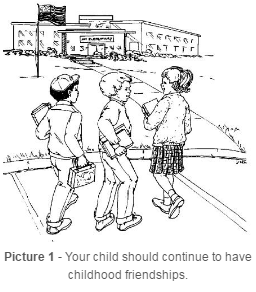
The HIV virus is not spread through "casual contact." Some ways HIV/AIDS is not spread are:
- Normal day-to-day contact like shaking hands, being in the same room or hugging
- Sharing plates, cups or silverware with someone who is HIV positive
- Using a phone or toilet seat after someone who is HIV positive
- Sharing a swimming pool with someone who is HIV positive
Studies show that so far no other family members of HIV- infected children have gotten the virus from casual contact. There is also no proof that young children with HIV infection are a risk to their classmates at school (Picture 1).
Signs of HIV Infection in Children
HIV- infected children may develop a number of signs and symptoms as a result of their HIV infection. However, HIV-infected children may have many years when they have no major health problems and they look, grow and act as other children. After a while the HIV virus may cause certain symptoms. However, some of these signs may also occur in children who have no medical problems at all. Or they may occur in children with other immune system problems.
Some of the more common signs in HIV-infected children include:
- Infections that keep coming back, do not go away or are more severe than in other children
- Swollen glands in more than one area (neck, armpits, groin)
- White patches in the mouth, on the tongue or in the throat (thrush) that don’t go away
- Repeated fevers
- Slower growth and development than other children the same age
- Diarrhea (3 or more loose stools per day) that continues for several weeks
- Repeated ear infections (more than 8 in a year)
- Certain kinds of tumors or cancers
The Health Care Team
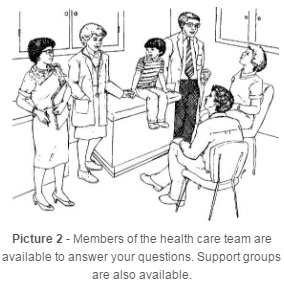
You probably have a lot of questions about caring for a child with HIV infection. The doctor, nurse, dietitian and social worker are here to help you and to answer your questions (Picture 2). This program is called the Family AIDS Clinic and Education Services (FACES). You and your child are also part of the team. It is very important that the HIV-infected child takes an active part in his or her own care. It’s important to involve the child in making decisions about his or her care. HIV- infected children should also be strongly encouraged to lead a normal life.
Protecting Yourself and Others
In general, parents should care for the HIV- infected child in the same way they care for any child. However, you will need to do a few special things to protect yourself and others from the HIV virus.
- Use disposable gloves when coming in contact with the child's blood or with body fluids that may contain blood.
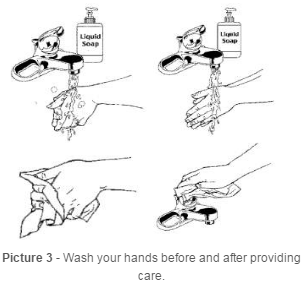
- Wash your hands before and after touching body fluids or providing care for the child (Picture 3).
- Wear disposable gloves and use paper towels when cleaning up any large spills of blood or stool. Then clean the area with bleach.
- Do not let anyone share razors or toothbrushes with the infected child.
- Cover any open or oozing wounds or sores to prevent contact with bloody body fluids.
- There is no need to separate the HIV-infected child's clothes from those of other family members unless they are heavily soiled with blood or other body fluids. Wash the child's clothes in hot, soapy water if they are heavily soiled with blood or other body fluids.
Protecting Your Child from Other Infections
The HIV-infected child has more trouble fighting off infections than other children. So you need to keep the child away from people who are ill with the flu, colds, measles, chickenpox and other common diseases.
- Your child should be allowed to play with other children. However, do not allow play with others that places the HIV-infected child at risk for infection (such as chickenpox or measles). Tell your doctor if your child has been exposed to any diseases.
- Just as for all children, the HIV-infected child should not share toys that he has put in his mouth or that other children have put into their mouths. The child's toys should be scrubbable, safe and clean.
- The HIV- infected child may use the same bathroom and toilet facilities as other family members.
- Pets that bite or scratch should be kept away from an HIV- infected child. Reptiles (especially turtles) and cats carry infections that are dangerous to HIV- infected children. These pets should be avoided. Check with your doctor before bringing pets into your home.
Dental Care
Good care of mouth and teeth is very important for the HIV- infected child because infections can begin in the mouth.
- Brush your child's teeth or have him brush at least twice a day. If his gums bleed when brushing, be sure to wear gloves. Rinse the toothbrush well then clean the sink with bleach.
- Get your child a new toothbrush every two months.
- Your child should have regular check-ups with his dentist.
Nutrition
Children with HIV infection may not grow as fast as other children. They may be smaller and thinner than others their age. This may be due to lack of appetite, diarrhea or infections that make it hard to chew or swallow.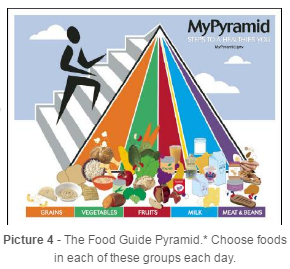
- Make sure your child eats a variety of foods every day from the food groups in the Food Guide Pyramid: fruit, vegetables, bread, meat, and dairy (Picture 4).
- If your child is not eating or is showing any signs of malnutrition, call his doctor. The doctor will ask a dietitian to talk with you and your child. The dietitian will ask about your child's favorite foods and make suggestions for foods he should eat.
Immunizations
Your child’s doctor will need to check your HIV-infected child for symptoms before giving any immunizations (vaccine shots).
- The varicella vaccine (for chickenpox) and the measles vaccine should be given only to HIV infected children whose immune systems are strong enough. Your child’s doctor will decide if your child can receive the chickenpox and measles vaccines.
- All other immunizations, including killed or injectable polio vaccine, should be given.
Support Groups
Having an HIV- infected child can stir many different feelings inside you. Sometimes this is very confusing and worrisome. Many parents find talking with other parents about common experiences and sharing ideas helps to make them feel better. There are support groups for families of HIV- infected persons. Ask your nurse or social worker about the support groups in your area.
For More Information
If you would like more information about caring for your HIV- infected child, you may call the CDC National AIDS Hotline at 1-800-342-2437. They are open 24 hours a day. If you have any questions, please call the Nationwide Children's Hospital HIV Program at (614) 722-6060.
*Developed as a cooperative effort by the U.S. Dept. of Agriculture, The American Dietetic Association, and the Food Market Institute.
HH-I-116 11/89, Revised 11/07 Copyright 1989-2007, Nationwide Children’s Hospital


